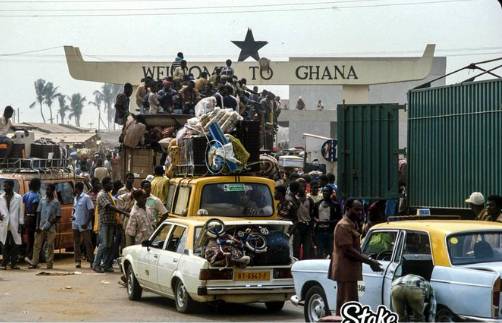The phrase "Ghana Must Go" carries significant historical weight in West Africa. It traces back to 1983, when Nigeria, facing an economic downturn, expelled over 2 million undocumented migrants, including around 1 million Ghanaians. This mass deportation marked a turning point in the relationship between the two nations and left an indelible mark on regional history.
In the late 1970s and early 1980s, Nigeria was a booming oil economy, attracting migrants from across West Africa. Many Ghanaians, escaping economic hardships and political instability in their own country, moved to Nigeria in search of better opportunities. However, Nigeria's fortunes shifted dramatically when global oil prices plummeted in the early 1980s. The resulting economic crisis led to high unemployment, inflation, and widespread discontent among Nigerians.
The government, under President Shehu Shagari, sought to address rising tensions by targeting undocumented migrants, whom locals blamed for taking jobs and straining public resources. In January 1983, Shagari issued an order giving all undocumented immigrants just two weeks to leave Nigeria or face forced deportation.
The announcement triggered chaos as millions of migrants scrambled to leave. Ghanaians, the largest group of migrants, faced especially harsh treatment. Many packed their belongings into the now-iconic red, blue, and white checkered plastic bags, which became synonymous with the phrase "Ghana Must Go." These bags have since become a symbol of displacement and resilience.
The journey back to Ghana was grueling. With limited transportation and inadequate support, many migrants trekked long distances, enduring hunger and exhaustion. Tragically, some lost their lives along the way.
The deportation strained relations between Ghana and Nigeria, though both governments eventually sought reconciliation. For Ghana, the sudden return of over a million people compounded its existing economic challenges. Yet, the deportees also brought back skills and experiences that contributed to Ghana's eventual recovery.
Today, "Ghana Must Go" is remembered as a cautionary tale about the dangers of scapegoating migrants during economic crises. The checkered bags, once symbols of displacement, have become a cultural artifact, representing resilience and adaptability in the face of adversity.
This event remains a poignant reminder of the interconnected histories and shared challenges of West African nations.




No comments yet
Be the first to share your thoughts!